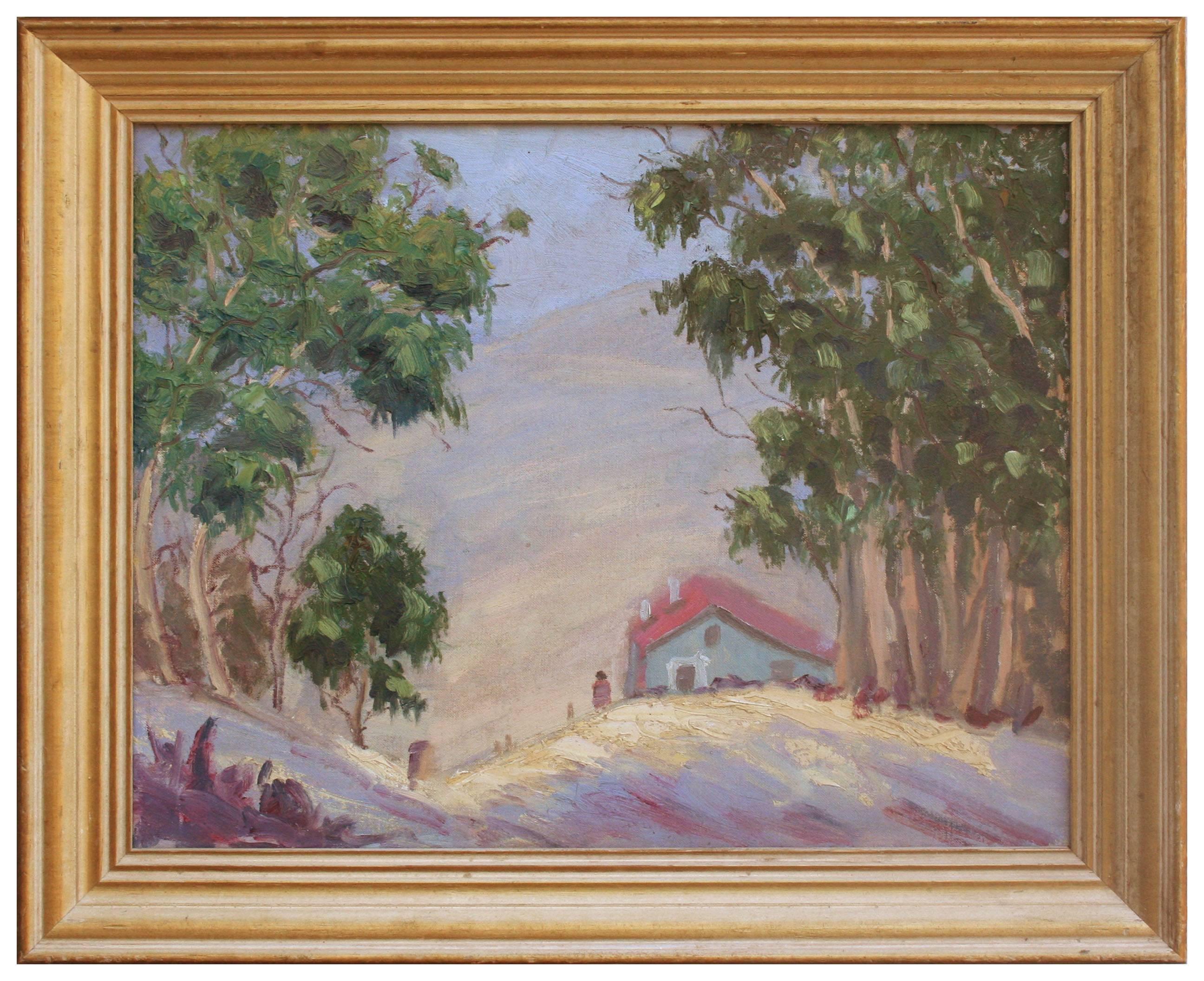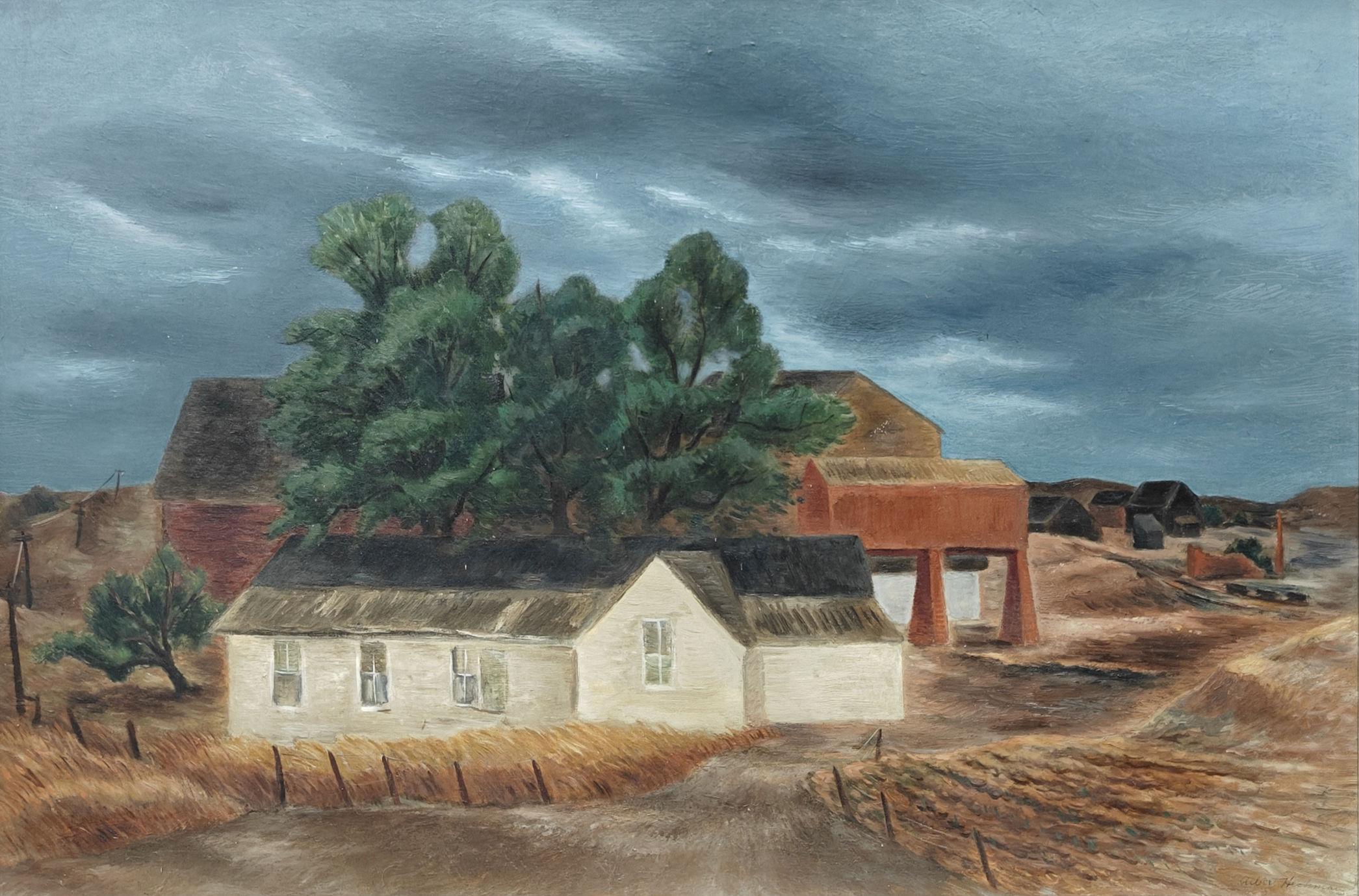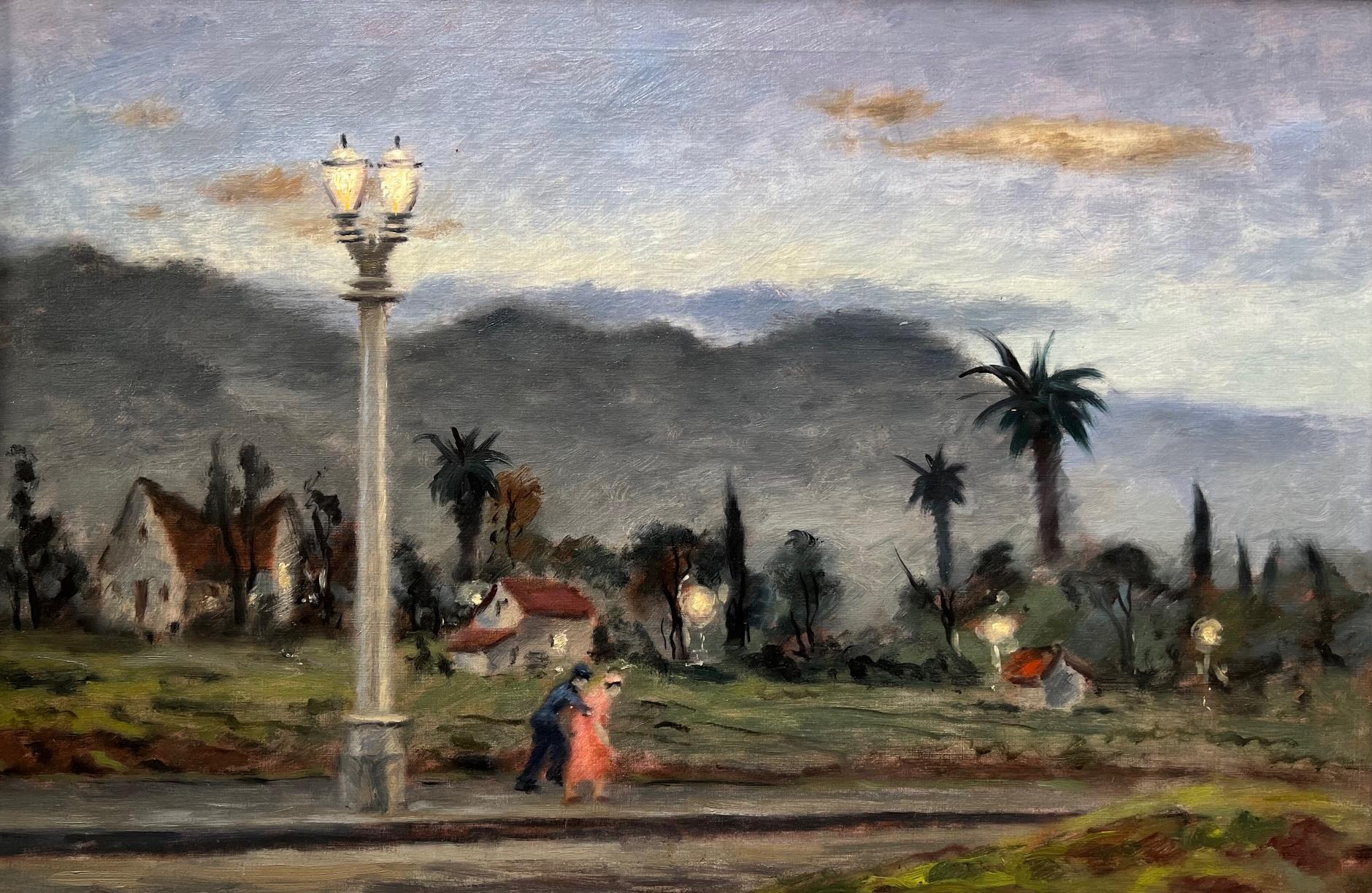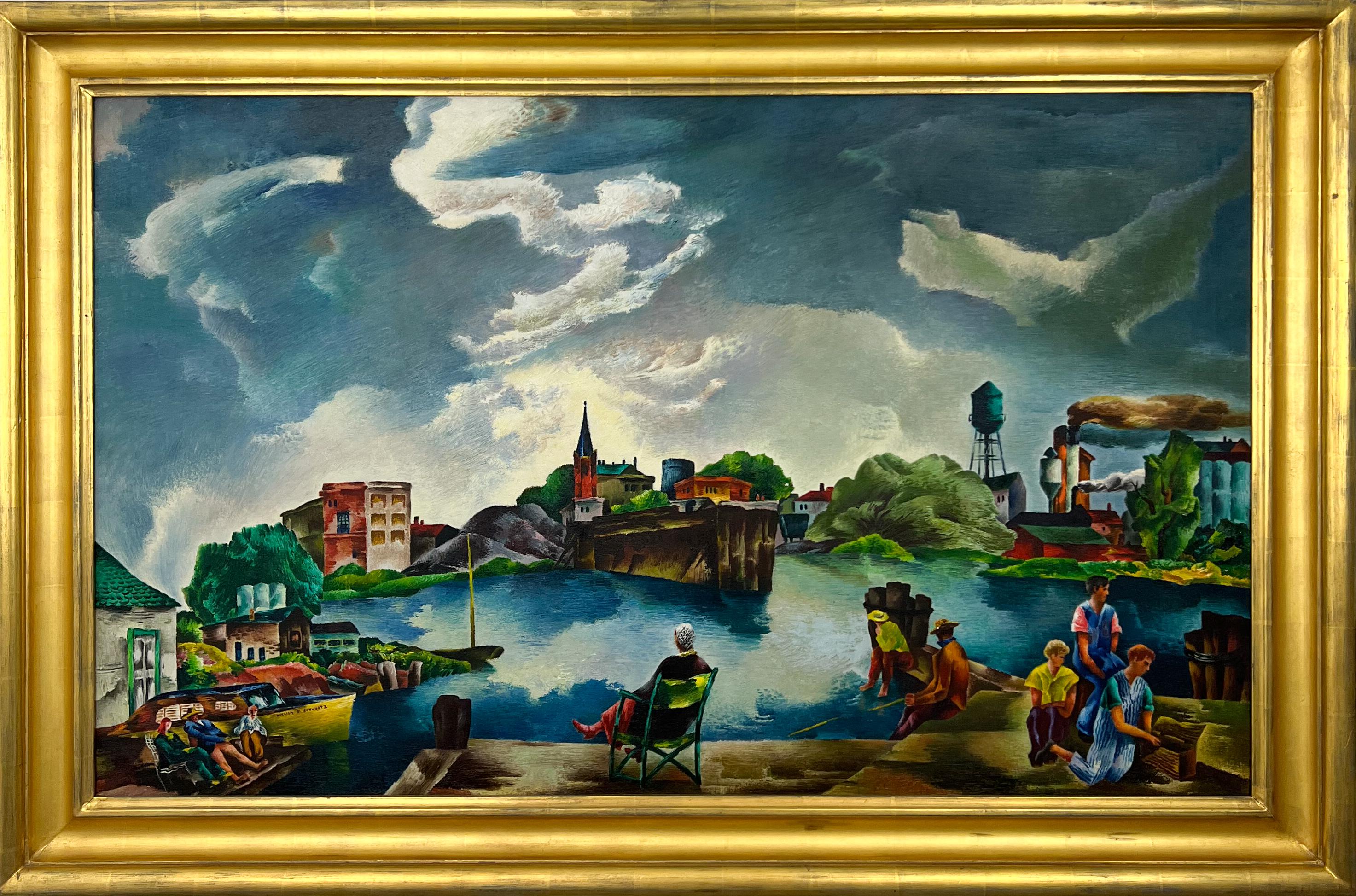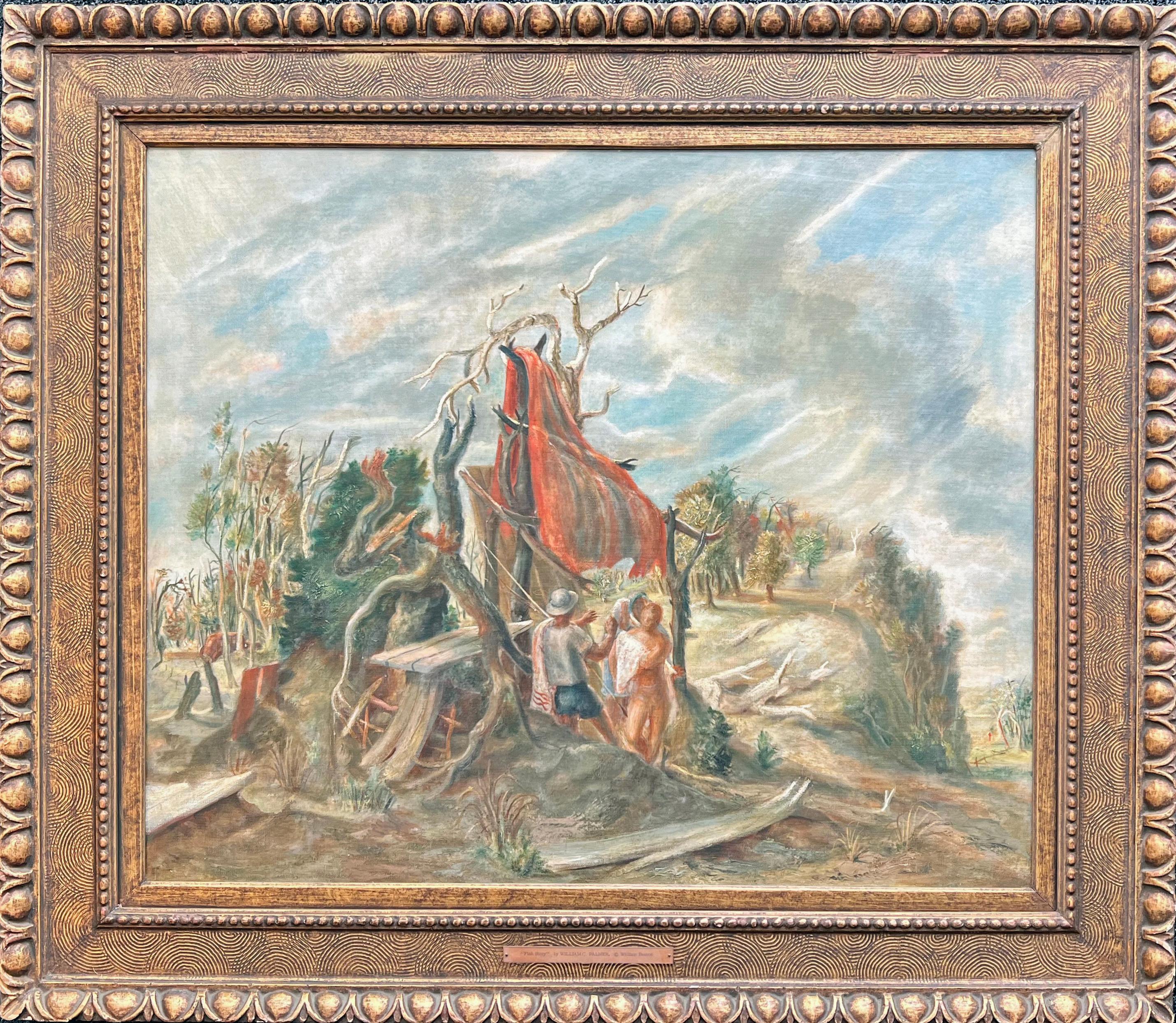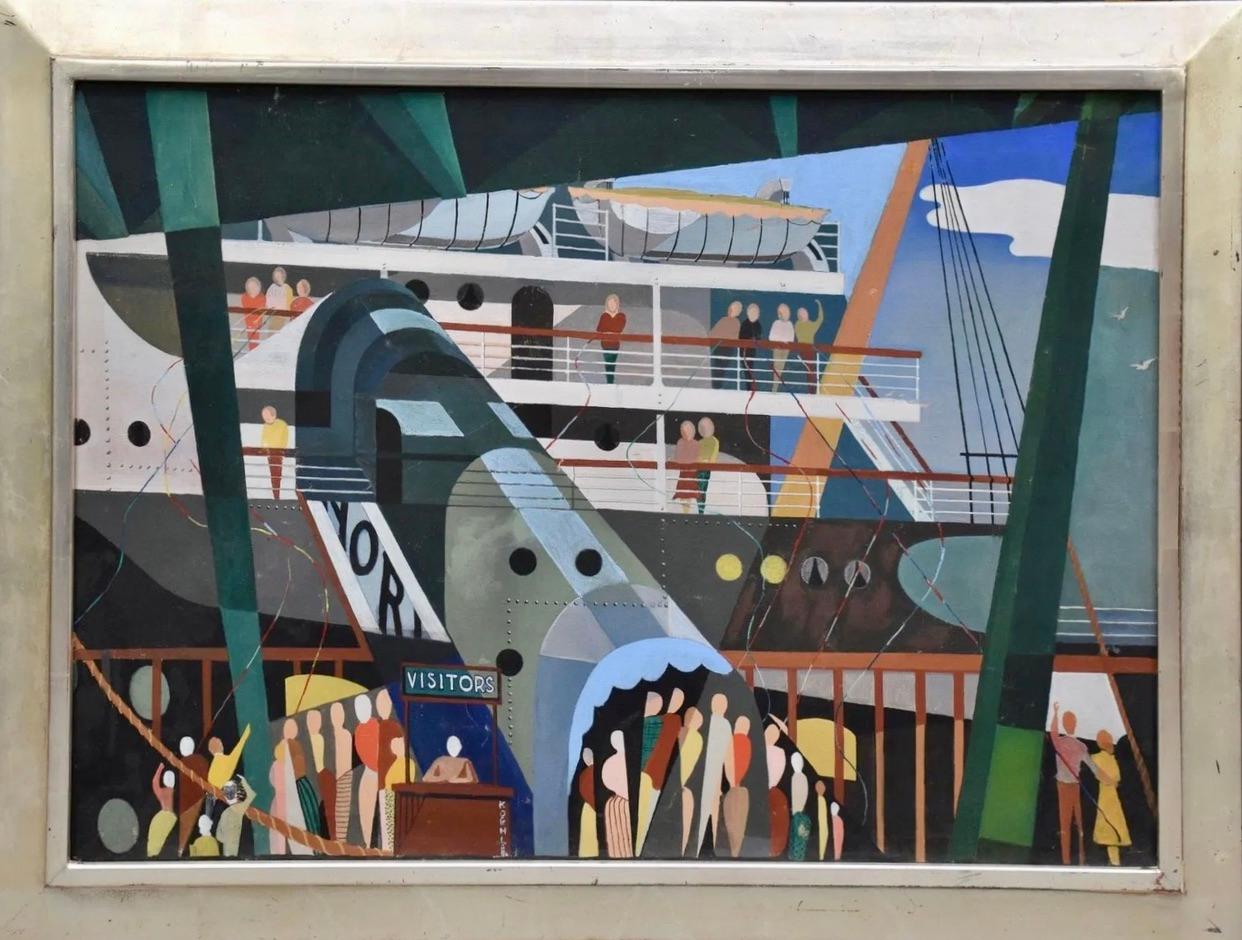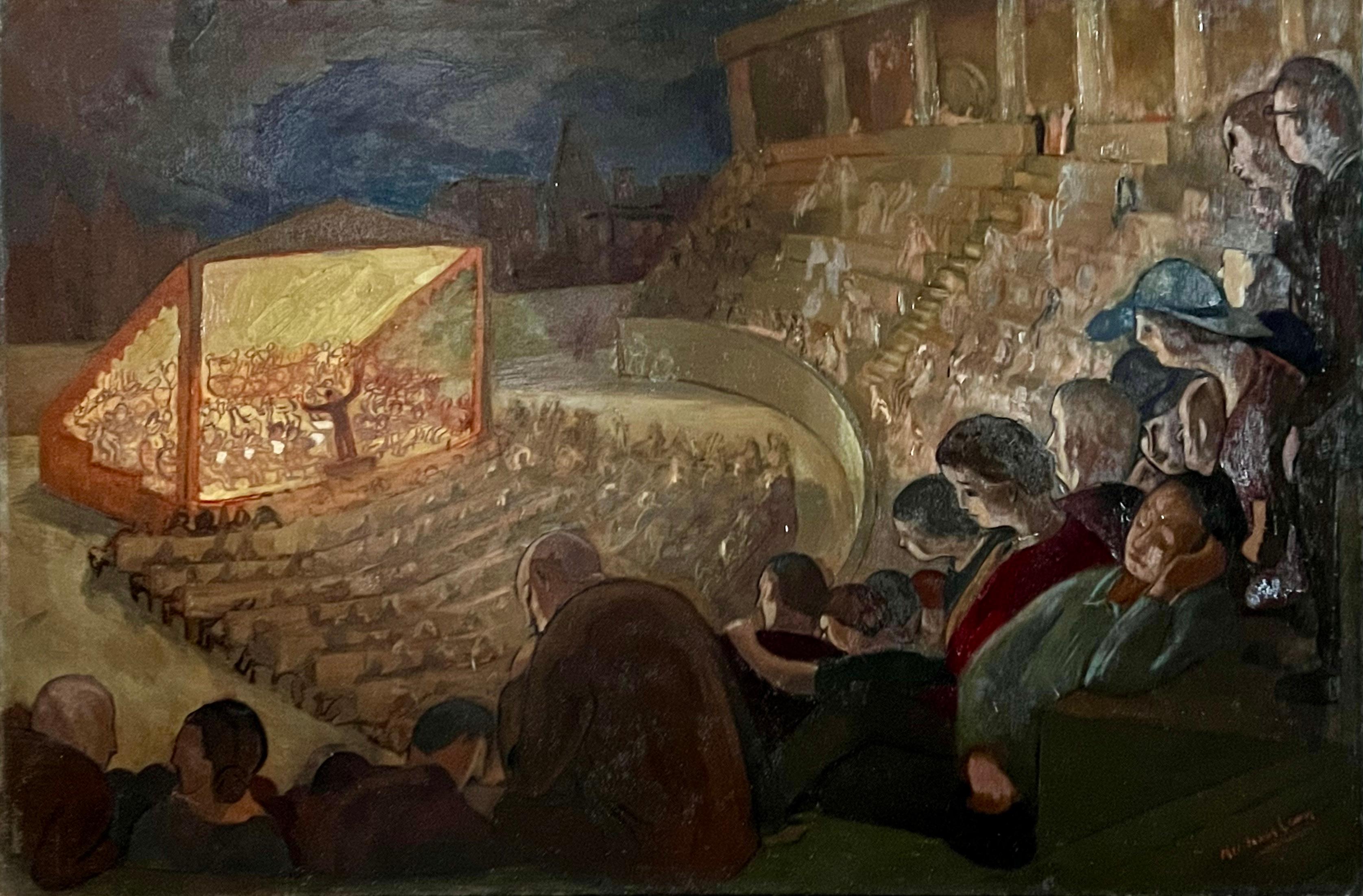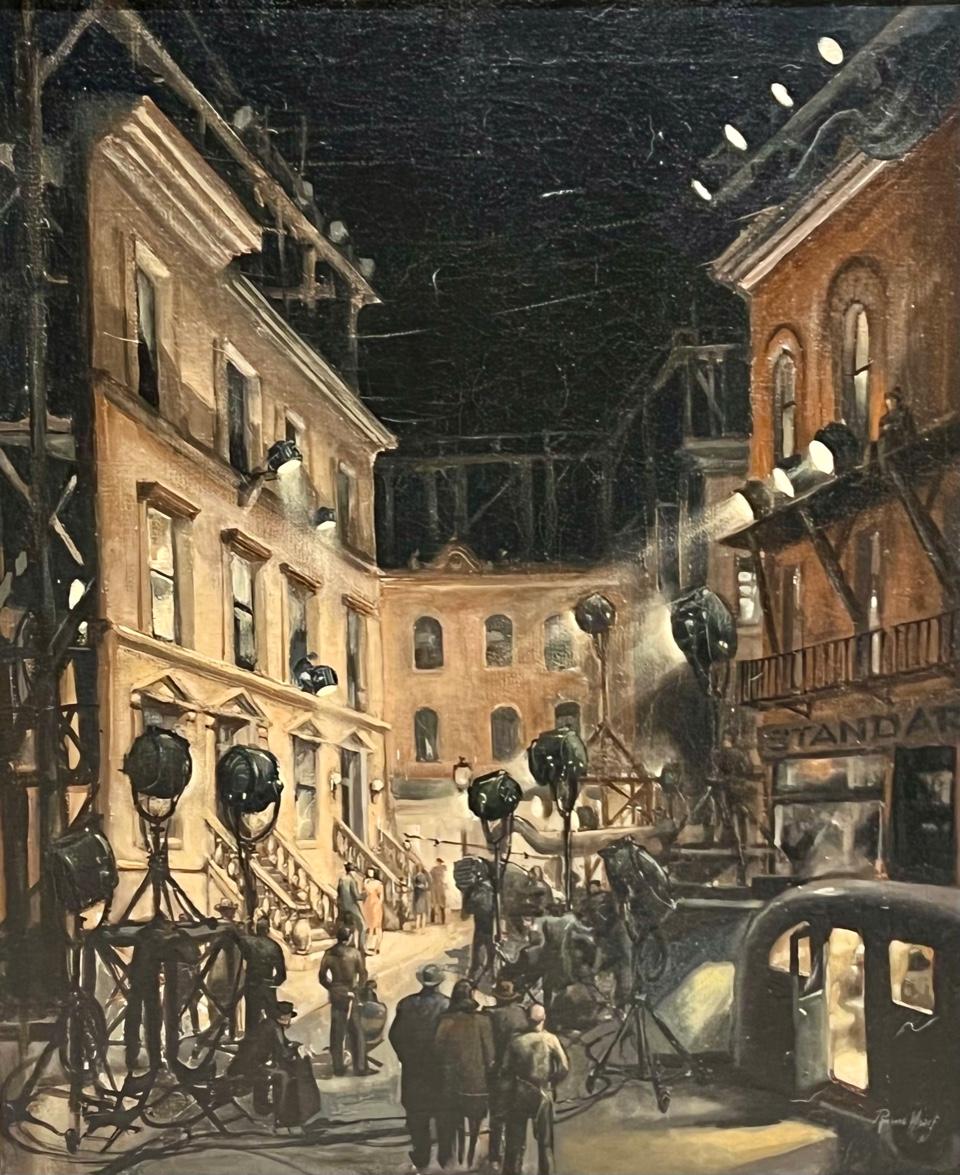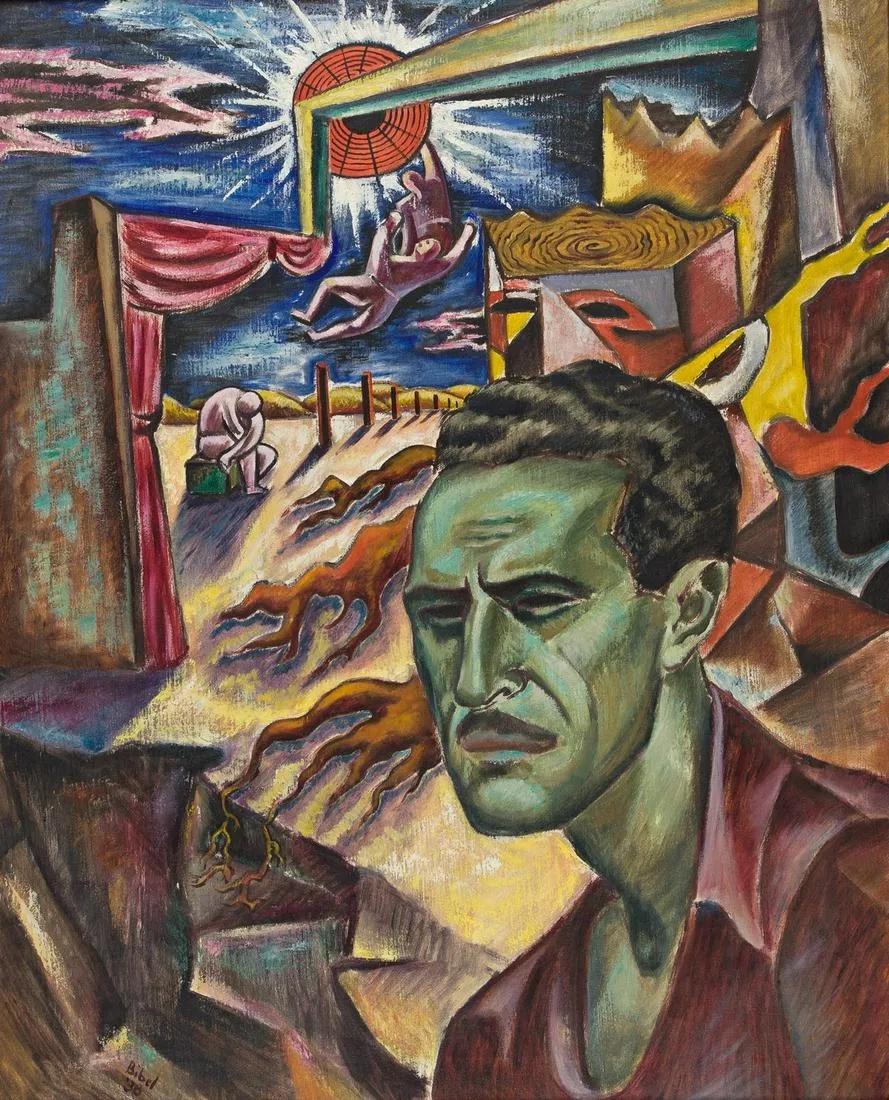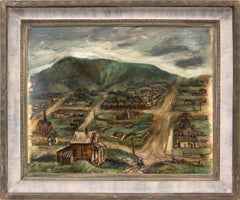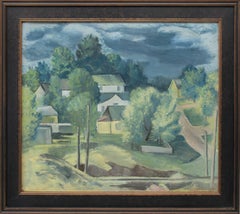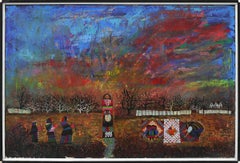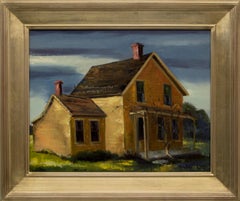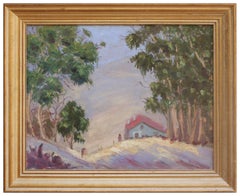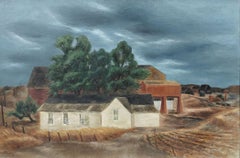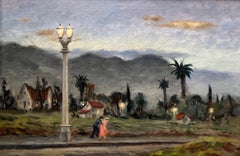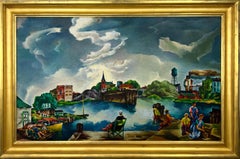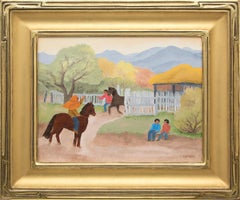
For a Sunday Ride (New Mexico)
View Similar Items
Want more images or videos?
Request additional images or videos from the seller
1 of 10
Barbara LathamFor a Sunday Ride (New Mexico)
Price:$6,000
$7,500List Price
About the Item
- Creator:Barbara Latham (1896 - 1989, American)
- Dimensions:Height: 16.75 in (42.55 cm)Width: 19.75 in (50.17 cm)Depth: 1.25 in (3.18 cm)
- Medium:
- Movement & Style:
- Period:
- Condition:very good to excellent vintage condition.
- Gallery Location:Denver, CO
- Reference Number:Seller: DCG-225811stDibs: LU2735638782
About the Seller
5.0
Gold Seller
Premium sellers maintaining a 4.3+ rating and 24-hour response times
Established in 1979
1stDibs seller since 2013
289 sales on 1stDibs
Typical response time: 13 hours
Authenticity Guarantee
In the unlikely event there’s an issue with an item’s authenticity, contact us within 1 year for a full refund. DetailsMoney-Back Guarantee
If your item is not as described, is damaged in transit, or does not arrive, contact us within 7 days for a full refund. Details24-Hour Cancellation
You have a 24-hour grace period in which to reconsider your purchase, with no questions asked.Vetted Professional Sellers
Our world-class sellers must adhere to strict standards for service and quality, maintaining the integrity of our listings.Price-Match Guarantee
If you find that a seller listed the same item for a lower price elsewhere, we’ll match it.Trusted Global Delivery
Our best-in-class carrier network provides specialized shipping options worldwide, including custom delivery.More From This Seller
View AllMartyl Schweig 1942 Oil Painting, Victor, Colorado, Ghost Town Landscape
By Martyl Suzanne Schweig Langsdorf
Located in Denver, CO
This stunning original 1942 oil painting, titled "Victor, Colorado", is by acclaimed American artist Martyl Suzanne Schweig (1918–2013). A vibrant and historically rich landscape, this work captures the abandoned ghost town of Victor, Colorado, set against the majestic backdrop of the Rocky Mountains. Rendered in rich hues of green, gold, and earthy brown, Schweig brings to life the rugged beauty and quiet mystery of Colorado’s once-booming mining towns.
The painting was completed during a plein-air painting trip with noted artist Adolph Dehn...
Category
1940s American Modern Landscape Paintings
Materials
Oil, Masonite
Colorado Hill Town with Storm Clouds, 1940s Modernist Landscape, Lush Green
By Paul Kauver Smith
Located in Denver, CO
This WPA-era signed oil painting by Paul K. Smith captures a stormy summer landscape in Colorado, featuring houses and lush trees under dramatic storm clouds. Painted in rich shades ...
Category
1940s American Modern Landscape Paintings
Materials
Oil
1980s Autumn Harvest, Original Semi-Abstract Landscape Oil Painting with Figures
By Edward Marecak
Located in Denver, CO
This original oil painting, titled Autumn Harvest by Edward Marecak (1919-1993), was created in 1987. It features a stunning autumnal landscape, with seven women actively engaged in ...
Category
1980s American Modern Landscape Paintings
Materials
Oil
ast Santa Cruz Landscape: Yellow Farmhouse with Storm Clouds Oil Painting
By Jon Blanchette
Located in Denver, CO
"East Santa Cruz (California)" is a captivating oil on canvas board by artist Jon Blanchette (1908-1987). The painting features a striking yellow farmhouse set against dark gray storm clouds, capturing the beauty and drama of the California landscape. The composition, with its bold contrast between the warm farmhouse and the looming storm, evokes a sense of both tranquility and tension. Presented in a custom frame, the outer dimensions of the painting measure 21 ¾ x 25 ¾ x 1 ½ inches, with the image size measuring 16 x 20 inches.
This artwork is in very good vintage condition, reflecting the care and craftsmanship of its creation. Please contact us for a detailed condition report.
Expedited and international shipping options are available—please reach out for a personalized shipping quote.
About the Artist:
Jon Blanchette, born on March 29, 1908, in Somerset, England, immigrated to Battle Creek, Michigan in 1918. He displayed artistic talent from a young age and went on to study at the Pittsburgh Art...
Category
1950s American Modern Figurative Paintings
Materials
Oil
1940s Modernist Oil Painting – Adobe Church Landscape, New Mexico Southwest Art
By Paul Kauvar Smith
Located in Denver, CO
This evocative vintage oil painting from the 1930s–1940s captures a classic adobe church in New Mexico, likely inspired by the historic San Francisco de Asís Mission Church in Rancho de Taos. Painted by Denver modernist Paul K...
Category
1940s American Modern Landscape Paintings
Materials
Oil
$2,760 Sale Price
20% Off
Twilight of History, 1940s Original Figurative American Modernist Oil Painting
By Frederick Shane
Located in Denver, CO
"Twilight of History" is an original oil on board painting by Frederick Shane (1906-1992), created in 1947. This captivating piece depicts a powerful scene reflecting the "twilight" ...
Category
1940s American Modern Figurative Paintings
Materials
Oil, Board
You May Also Like
Morning Sunrise, Mid Century Laguna Hills Figurative Landscape
Located in Soquel, CA
Beautiful mid century plein air figural landscape of Laguna Niguel, California by an unknown artist (American, 20th Century). The morning sun gli...
Category
1950s American Modern Landscape Paintings
Materials
Canvas, Oil, Cardboard
$719 Sale Price
20% Off
"Glasco Landscape" Albert Heckman, circa 1940 New York Modernist Landscape
By Albert Heckman
Located in New York, NY
Albert Heckman
Glasco Landscape, circa 1940
Signed lower right
Oil on canvas
25 1/4 x 39 1/2 inches
Albert Heckman was born in Meadville, Western Pennsylvania, 1893. He went to New York City to try his hand at the art world in 1915 after graduating from high school and landing a job at the Meadville Post Office. In 1917, at the age of 24, Heckman enrolled part-time in Teachers' College, Columbia University's Fine Arts Department to begin his formal art education. He worked as a freelance ceramic and textile designer and occasionally as a lecturer at the Metropolitan Museum of Art. In the early 1920s, at the age of almost 30, he graduated with a Bachelor of Arts degree from Columbia Teachers College. He was especially impacted by his instructor at Columbia, Arthur Wesley Dow.
After graduating, he was hired by the Teachers' College as a Fine Arts instructor. He stayed with Columbia Teachers' College until 1929, when he left to attend the Leipzig Institute of Graphic Arts in Leipzig, Germany. Isami Doi (1903-1965), who was born in Hawaii, was arguably his most impressive student at Columbia. Doi is now regarded as one of the most prominent artists hailing from Hawaii. Heckman became an active member and officer of the Keramic Society and Design Guild of New York in the 1920s as part of his early commercial art career. The Society's mission was to share knowledge and showcase textile and ceramic design exhibits.
In 1922, Heckman married Florence Hardman, a concert violinist. Mrs. Heckman's concert schedule during the 1920s kept Albert and Florence Heckman apart for a significant portion of the time, but they spent what little time they had together designing and building their Woodstock, New York, summer house and grounds. A small house and an acre of surrounding land on Overlook Mountain, just behind the village of Woodstock, were purchased by Albert and Florence Heckman at the time of their marriage. Their Woodstock home, with its connections, friendships, and memories, became a central part of their lives over the years, even though they had an apartment in New York City.
Heckman's main artistic focus shifted to the house on Overlook Mountain and the nearby towns and villages, Kingston, Eddyville, and Glasco. After returning from the Leipzig Institute of Graphic Arts in 1930, Mr. Heckman joined Hunter College as an assistant professor of art. He worked there for almost thirty years, retiring in 1956. Throughout his tenure at Hunter, Mr. Heckman and his spouse spent the summers at their Woodstock residence and the winters in New York City. They were regular and well-known guests at the opera and art galleries in New York. Following his retirement in 1956, the Heckmans settled in Woodstock permanently, with occasional trips to Florida or Europe during the fall and winter. Mr. Heckman's close friends and artistic career were always connected to Woodstock or New York City. He joined the Woodstock art group early on and was greatly influenced by artists like Paul and Caroline Rohland, Emil Ganso, Yasuo Kuniyoshi, Andre Ruellan, and her husband, Jack...
Category
1940s American Modern Figurative Paintings
Materials
Canvas, Oil
Six O'Clock
Located in Los Angeles, CA
Six O-Clock, c. 1942, oil on canvas, 30 x 20 inches, signed and titled several times verso of frame and stretcher (perhaps by another hand), marked “Rehn” several times on frame (for the Frank K. M. Rehn Galleries in New York City, who represented Craig at the time); Exhibited: 1) 18th Biennial Exhibition of Contemporary American Oil Paintings from March 21 to May 2, 1943 at The Corcoran Gallery of Art in Washington, D.C. #87, original price $450 (per catalog) (exhibition label verso), 2) Craig’s one-man show at the Frank K. M. Rehn Galleries, New York City, from October 26 to November 14, 1942, #10 (original price listed as $350); and 3) Exhibition of thirty paintings sponsored by the Harrisburg Art Association at the State Museum of Pennsylvania in Harrisburg in March, 1944 (concerning this exhibit, Penelope Redd of The Evening News (Harrisburg, Pennsylvania) wrote: “Other paintings that have overtones of superrealism inherent in the subjects include Tom Craig’s California nocturne, ‘Six O’Clock,’ two figures moving through the twilight . . . .” March 6, 1944, p. 13); another label verso from The Museum of Art of Toledo (Ohio): original frame: Provenance includes George Stern Gallery, Los Angeles, CA
About the Painting
Long before Chris Burden’s iconic installation outside of the Los Angeles County Museum of Art, Urban Light, another artist, Tom Craig, made Southern California streetlights the subject of one of his early 1940s paintings. Consisting of dozens of recycled streetlights from the 1920s and 1930s forming a classical colonnade at the museum’s entrance, Burden’s Urban Light has become a symbol of Los Angeles. For Burden, the streetlights represent what constitutes an advanced society, something “safe after dark and beautiful to behold.” It seems that Craig is playing on the same theme in Six O-Clock. Although we see two hunched figures trudging along the sidewalk at the end of a long day, the real stars of this painting are the streetlights which brighten the twilight and silhouette another iconic symbol of Los Angeles, the palm trees in the distance. Mountains in the background and the distant view of a suburban neighborhood join the streetlights and palm trees as classic subject matter for a California Scene painting, but Craig gives us a twist by depicting the scene not as a sun-drenched natural expanse. Rather, Craig uses thin layers of oil paint, mimicking the watercolor technique for which he is most famous, to show us the twinkling beauty of manmade light and the safety it affords. Although Southern California is a land of natural wonders, the interventions of humanity are already everywhere in Los Angeles and as one critic noted, the resulting painting has an air of “superrealism.”
About the Artist
Thomas Theodore Craig was a well-known fixture in the Southern California art scene. He was born in Upland California. Craig graduated with a degree in botany from Pomona College and studied painting at Pamona and the Chouinard Art School with Stanton MacDonald-Wright and Barse Miller among others. He became close friends with fellow artist Milford Zornes...
Category
1940s American Modern Landscape Paintings
Materials
Canvas, Oil
$12,500
Summer Resort in Michigan -Modernist Mid-Century Saugatuck Oil Painting
Located in Marco Island, FL
Summer Resort in Michigan is an exceptional work painted by the Chicago Modernist, William Schwartz. He studied at the Art Institute of Chicago shortly ...
Category
1940s American Modern Landscape Paintings
Materials
Canvas, Oil
Fish Story oil painting by Williams Charles Palmer
Located in Hudson, NY
This painting is illustrated in the Catalogue of the 1945 Encyclopedia Britannica Collection of Contemporary American Painting, p.84. Written and edited by Grace Pagano.
"Painting ...
Category
Mid-20th Century American Modern Figurative Paintings
Materials
Canvas, Oil
"Cruise Ship Rolls In" Mid 20th Century American Contemporary Modern Realism
Located in New York, NY
"Cruise Ship Rolls In" Mid 20th Century American Contemporary Modern Realism
This is one sensational painting. And we can even identify the artist, but can't find anything about the...
Category
Mid-20th Century American Modern Figurative Paintings
Materials
Canvas, Oil
Recently Viewed
View AllMore Ways To Browse
Vintage Paratrooper Posters
Vintage Pole Vault
Vintage Posters Alo
Vintage Rogers Watch
Vintage Solar Panel
Vintage Victory Garden Poster
Vintage Wisconsin Travel Posters
Vintage World Map Mirror
Vivian Springford
Vladimir Cora
Warhol Chanel Prints
Warhol Corn Flake
Warhol Dracula
Warhol Endangered Species
Warhol Pussy
Warhol Trucks
Wesselmann Blonde
Whooping Crane
